Political campaigns to change US policy towards Vietnam
After the end of the Vietnam War, Vietnam-US relations fell into a state of prolonged suspicion and tension. However, Vietnam was still a concern for many Americans, especially for US veterans who fought in Vietnam. Returning from the war, the US veterans wanted to do something to help the country and people of Vietnam. The case of veteran Bobby Muller was a typical example. During the Vietnam War, Bobby Muller was a Marine, wounded and completely paralyzed from the waist downward. Returning to the United States, Bobby Muller became President of the US Veterans Fund in Vietnam. He had many special relationships with powerful figures in US political circles, including Senator Patrick Leahy. Knowing that Senator Patrick Leahy founded “Leahy War Victims Support Fund” to support war victims around the world. Bobby Muller reached out to Senator Patrick Leahy's office, seeking to bring the fund to support war victims in Vietnam. At that time, the relationship between two countries was not developed. The support for Vietnam, if any, would be considered a foreign aid. These moves were not unique to the rank of US veterans.
With their experiences in Vietnam, many US veterans realized that Vietnam was a country with a long-lasting and abundant history. There may be some disagreements between two countries, but something needs to be done to bring two countries closer to each other despite plans to promote normalization or improve relations with Vietnam always faced criticism as a treason.
The strongest supporters of normalizing relations were veterans John Kerry and John McCain. Both men ever fought in Vietnam. They along with a number of other veterans such as Chuck Hagel (later US Secretary of Defense), Mr.Thomas J. Vallely (who was strongly promoting Fulbright University project) supported the process of normalizing relations of two countries. These veterans hold positions in US political life, so they had condition to promote the process of normalizing relations. From a prisoner detained in Vietnam, Senator John McCain made tireless efforts in his career to resolve the hatred and create peace between two Countries. As early as 1977, McCain was renowned as an ardent supporter for closer relations between Vietnam and the United States. He first returned to Hanoi in 1985, 10 years before diplomatic relations between two countries were restored
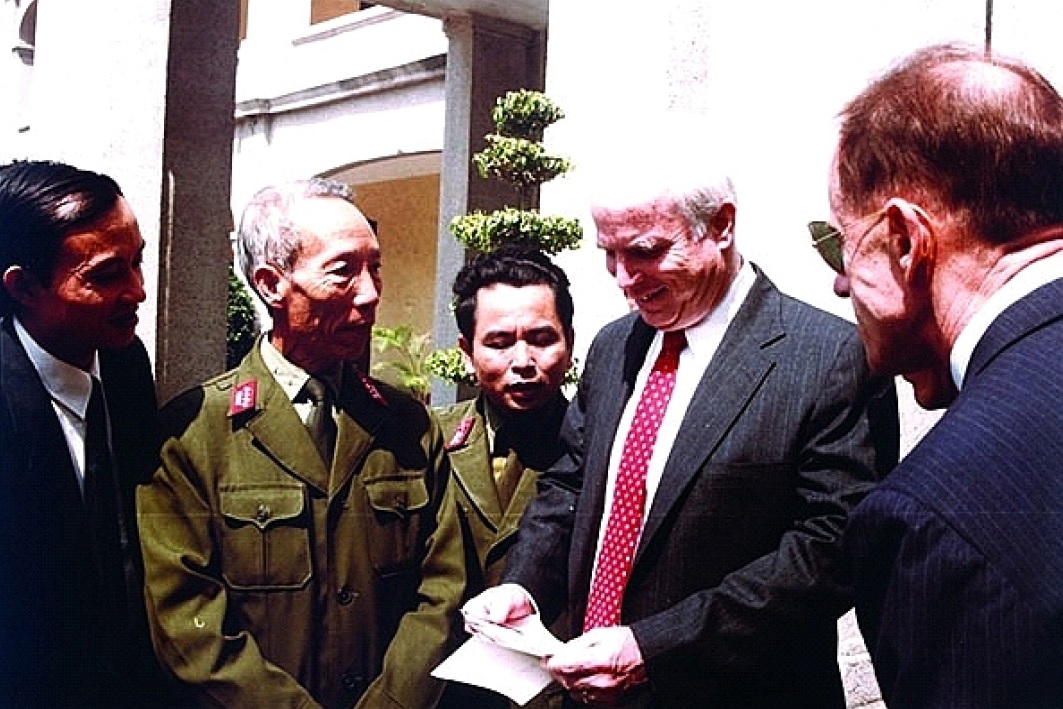
Photo: Senator John McCain once returned to visit Vietnam
To make an important and significant influence of the US government's decisions on Vietnam-US relations, there were also veteran groups, especially VVA (Vietnam Veterans of America). VVA believed that the US should not maintain an outdated isolation policy against Vietnam. Improving relations with Vietnam would help former US veterans overcome the psychological trauma when they could return to the place that used to be the battlefield and release the origin of any anxiety and stress, thereby reducing the influence of "Vietnam Syndrome" in the heart of the United States. VVA had a close relation to the veterans who were members of the US Congress, some Senators, typically John Kerry, John Mc Cain or Pete Peterson. This made their voices heard more by the Congress than other Organizations.
Diplomatic campaigns towards normalization of Vietnam-US relations.
In the early 90s of the twentieth century, in the context of American politics had not forgotten the defeat hatred and issues of war prisoners as well as lost soldiers in Vietnam war (POW/ MIA) were politicized. In 1991, a special committee on prisoners of war and Americans missing in the Vietnam War was established, Senator John Kerry acted as the chairman of this committee. The committee member also included John McCain and a number of other characters who were also involved in the Vietnam War. The committee's responsibility was to investigate the fate of US servicemen listed as missing during the Vietnam War. At that time, American public opinion said that in Vietnam there were still Americans alive. They were detained as a hostage and demanded for compensation.
To clarify the skepticism on many members of the committee, in which the senator John Kerry and several others returned to Vietnam to survey the program of searching for Americans missing in the Vietnam War.
After a process of serious work and cooperation in good faith of Vietnam, the 223-page report of the committee mentioned above (chaired by Senator John Kerry) concluded: “There is no persuasive evidence that there are Americans stil alive and prisoners in Southeast Asia”. Disapproving this conclusion, in Washington, a "front" against John McCain and John Kerry was formed. A second investigation was required. Once again, a report by the Senate commiittee on the issue of POW/ MIA dated January 13, 1993 concluded that “there were no more American POWSsin Vietnam”. The report was complete by the time when Mr. Bill Clinton entered the White House. In an important meeting with the President on June 11, 1993 in the Oval Office, together with Senator John Kerry, Senator John McCain persuaded President Bill Clinton to repeal the Vietnamese embargo which, according to them, it was "a matter of national honor, because Vietnam has done everything that we ask for (regarding PO / MIA)". A week later, on June 19, when President Clinton went to Northeastern University, Senators Kerry and McCain also accompanied him, with the purpose of repeatedly mentioning the issue of Vietnam in the Presidents agenda. In January 1994, the Senate's Resolution on the removal of the Vietnamese embargo drafted by John Kerry and John McCain, was formally discussed in Congress. John McCain persuaded 20 congressional Republicans to support. The resolution was adopted, with a ratio of 62 votes through/ 38 votes out. With the appearance of the Senate's Resolution, the Clinton government loosened sanctions against Vietnam. On February 4, 1994, the New York Times published the title "Clinton lifted the 19-year embargo against Vietnam”. The headline was accompanied by a photo (baby girl) Kim Phục suffered from a napalm bomb-caused burn of Nick Ut. Despite of great advances, the process of normalization of Vietnam - US relations still faced obstacles from the opposites. Kerry and McCain continued their efforts. On May 23, 1995, Kerry and McCain met President Clinton in the Oval Office. Once again, two senators presented the reason and explanation for the necessity to re-establish diplomatic relations with Vietnam. McCain said; "It makes no sense to me, Mr. President, when it comes to those who support or fight the war. I am too tired to look back at the past with resentment.

Photo: US Senator John Kerry during a trip to Hanoi to investigate, survey the issue of POW/ MIA in November 1992.
The important thing now is that we must move forward". On July 11, 1995, President Clinton summoned cabinet members, senior military officials, key members of Congress, leaders of veteran organizations ... to the White House. In front of the podium, President Clinton declared: "Today, I declare to normalize diplomatic relations with Vietnam." In his speech, President Clinton emphasized: “This moment gives us the opportunity to bandage our own wound. They were against the time for too long. Now we can go forward on a common ground. Everything that has split us us before, let them in the past. Let this moment, speaking of the Bible, be a time to heal, a time to build”. Next, President Bill Clinton turned to the person who was standing adjacent, John McCain. They shook hands and hugged each other. He then turned to John Kerry again ... In the context of that history, John McCain said: "I support the president's decision today to restore diplomatic relations with Vietnam. It is not an easy decision for any president. President Clinton has shown courage and respect in his determination”
The special thing is that after that, the US veteran ever fought in Vietnam - Pete Peterson was approved by the US Congress to become the first US ambassador to Vietnam after 1975. Ambassador Peterson, who used to be US Air Force pilot in the Vietnam War and six years prisoner of war, devoted his entire tenure to mend and build a long-term relationship between Vietnam and the United States.
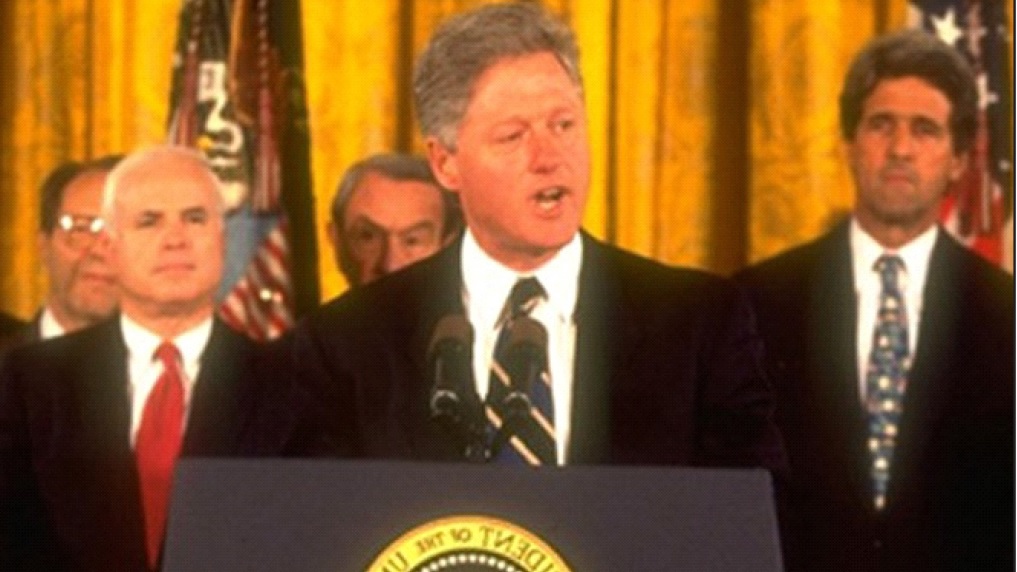
Photo: President Clinton delivered a speech of normalization of Vietnam and the US relations. Behind the president Clinton were senators John McCain and John Kerry
The special thing is that after that, the US veteran ever fought in Vietnam - Pete Peterson was approved by the US Congress to become the first US ambassador to Vietnam after 1975. Ambassador Peterson, who used to be US Air Force pilot in the Vietnam War and six years prisoner of war, devoted his entire tenure to mend and build a long-term relationship between Vietnam and the United States.
In 1999, the inauguration ceremony of the US Consulate in Ho Chi Minh City took place on the ground of the former US Embassy. The ceremony was attended by another veteran, Senator of Nebraska state Chuck Hagel, who later became US Defense Secretary under the period of President Obama. It was a vivid symbol of reconciliation between Vietnam and the United States.
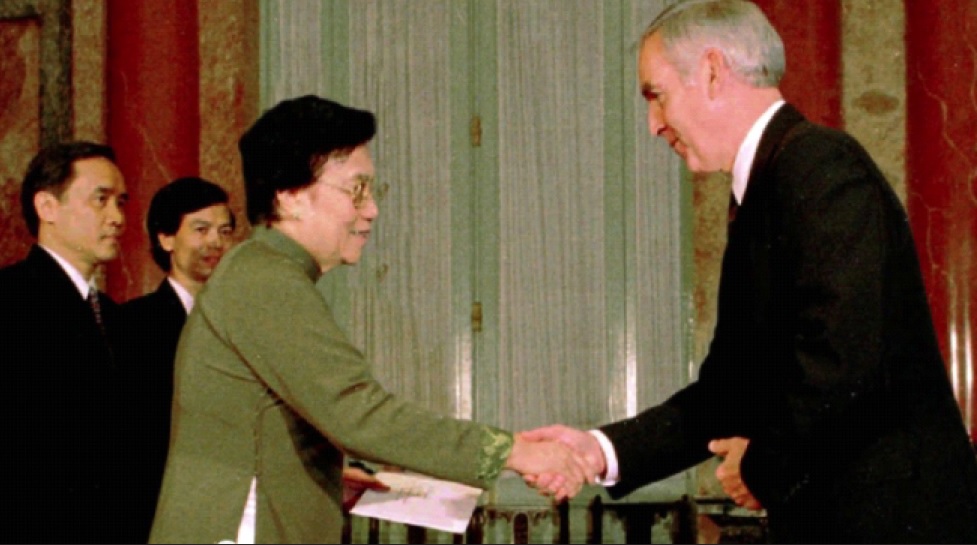
Photo: Veteran Pete Peterson acting as the first US Ambassador to Vietnam after 1975 greeted Vice President Nguyen Thi Binh
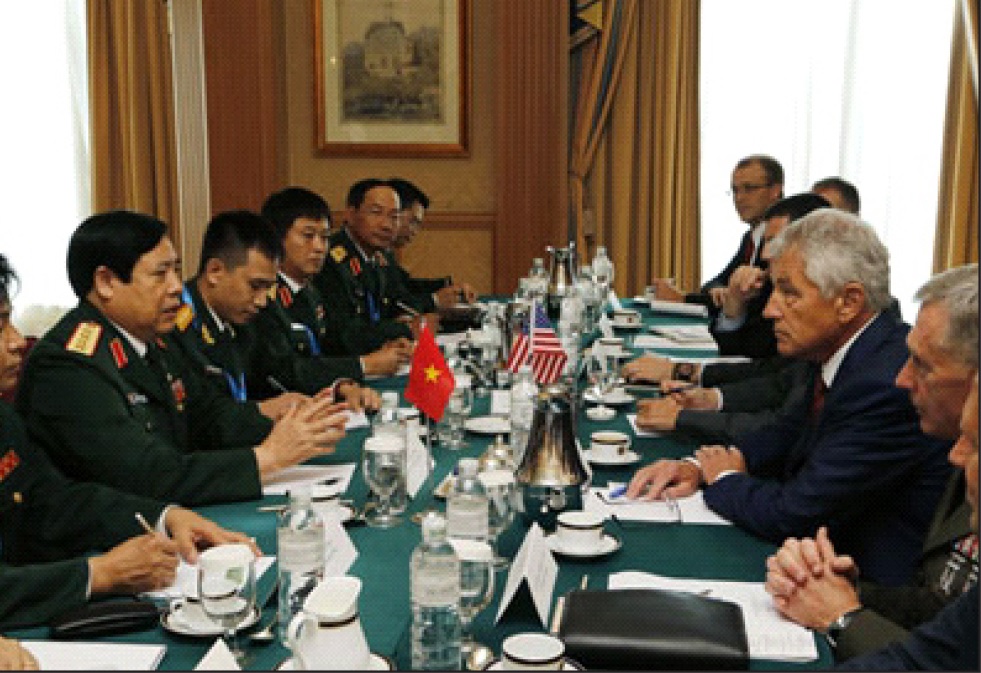
Photo: Secretary of State Chuck Hagel and the US defense mission once worked with the Ministry of Defense of Vietnam
In the process of normalization of Vietnam and the United States relations, there was a aradox that the people who used to participate in the war became pioneers in the relationship between two countries as commented by Senator John Kerry: "Supporters of normalization may be accused of treason in both countries. The paradox was that the promotion of peace and reconciliation between two countries were led by the most war participants, especially veterans. In this process, the aforementioned US veterans represented only the common efforts of the American veteran community to heal the relationship between two countries. They played an important role in the process of healing the Vietnam war wound, eliminating obstacles in the political-diplomatic relations between Vietnam and the United States, and laying the first bricks for development of economy, trade and investment cooperation between two countries in the later period.
Building relationships towards the future between two countries
In modern history, when orthodox diplomatic measures between countries were in trouble, method of people's diplomacy would open the door for two sides to access. The world used to witness the forms of ping-pong diplomacy, basketball diplomacy, cultural diplomacy... In the relationship between Vietnam and the United States, the "veteran” diplomacy had a very outstanding role. The veterans were the ones directly involved in the war, in life and death moments of the war, always looked for ways to destroy each other, at this time, the war has passed, if they bravely ignored the past, sat together, it would be the best message to move to the process of normalization of diplomatic relations, because they were the ones that paid the highest prices, best understood the value of war. During the recent visits of US heads of state to Vietnam, President B. Obama and D. Trump both mentioned the role of veterans in the reconciliation process of two countries. The "Veteran” Diplomatic form has become a message when the former enemies sit together, understand each other and feel the great losses of war and the value of protecting peace to mutually wish that there will be only peace and cooperation between two nations as a spirit of the signed treaty of the leaders of two countries such as Colonel Charlene Tutt - Head of the American pilot delegation who once came to Vietnam spoke: “The closer we become, the more we understand and appreciate each other through these meaningful meetings, hoping this will bring our two countries closer.”
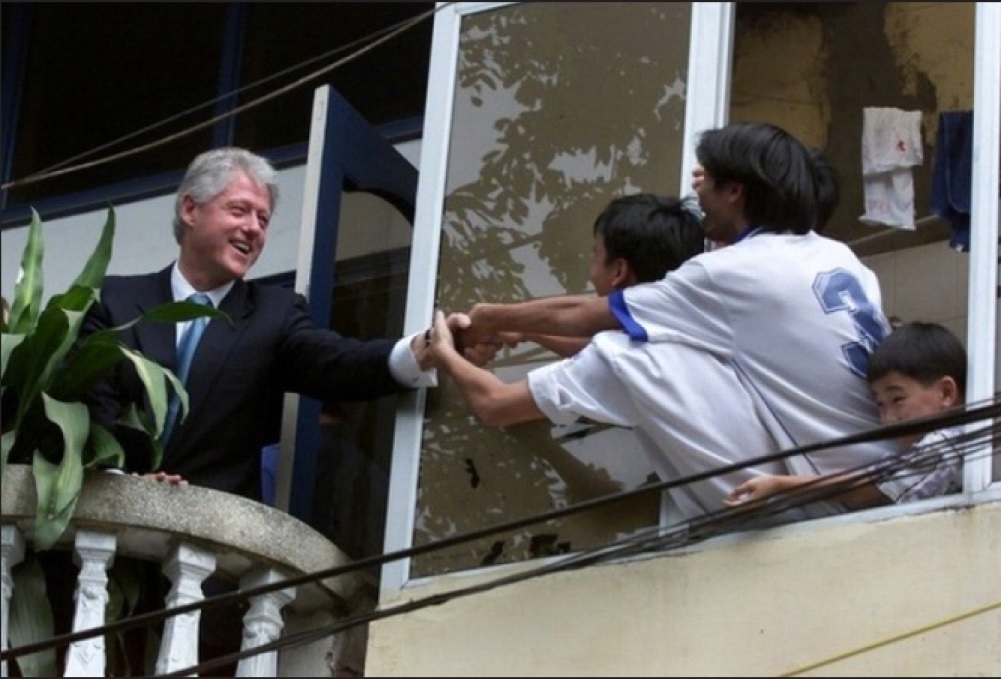
Photo: US President Bill Clinton shook Hanoi's people after visiting Temple of Literature in a visit to Vietnam in 2000. (Source: AP)
After normalization, two countries have established and maintained a positive political and diplomatic relationship. The senior leaders of Vietnam and the United States made 6 official trips to the capitals of two countries: US President Bill Clinton, George W. Bush, Barack Obama and Donald Trump visited Vietnam in years of 2000, 2006, 2016 and 2017; President Nguyen Minh Triet, Prime Ministers Phan Van Khai, Nguyen Tan Dung and Nguyen Xuan Phục paid official visits to the United States in 2005, 2007, 2008 and 2017. Until 2009, Vietnam-US two-way trade reached VND 15.6 billion (an increase of more than 30 times compared to that of 1995). The United States became Vietnam's largest export market, the second largest investor in Vietnam with a capital of USD 9.8 billion, accounting for 25% of total FDI into Vietnam. In 2013, Vietnam and the United States established a comprehensive partnership based on the principle of respect for the UN Charter, international law, respect for political institutions, independence, territorial sovereignty and integrity of each other.
Today, US veterans continue to promote exchanges and strengthen relations between two countries, especially in the fields of providing information related to the missing Vietnamese soldiers in the war; educating young Americans on peace, aftermath of the war, the struggle for victims of Agent Orange of both sides, ... , which brought many positive results. Up to now, only in the framework of the "Veteran Initiative” program, US veterans have visited and transferred Vietnam 304 documents with about 12,000 cases of Vietnamese soldiers missing in the war, thereby helping the Vietnamese side to search and gather about 1,500 remains of martyrs. These contributions have contributed significantly to strengthen and enhance the relationship between two countries.
Nguyễn Trọng Minh